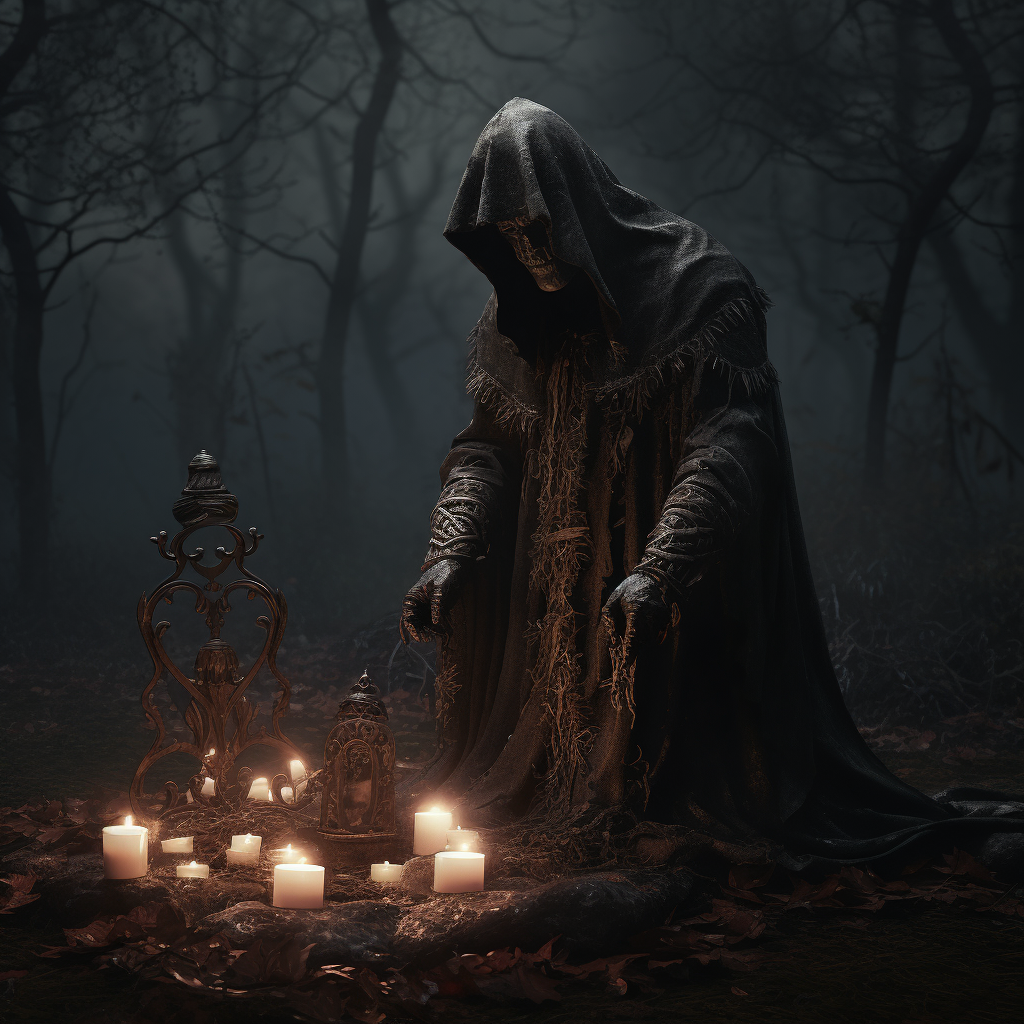Necromancer
Necromancy is a profession almost as much about philosophy than just being a mage. Each deals with the dead in some form or fashion, and many give in to dark urges to raise the dead or turn into the undead themselves.
Career
Qualifications
Each necromancer learns spells as any mage would. What sets them apart is the spells used. The school of necromancy is rarely obvious. Only once that they can grasp the nature of life and death, and how to control those who have meant to have passed on do they become recognised as a necromancer. A strong personality is found in many and usually those who advance have developed a strong enough will to dominate the risen dead, and cope with the smell & look of the dead.
Nearly all are taught that there is only a thin veil between the living and the dead, and that by dealing with those that would protect the veil can be bargained with for the right price. Only by paying the price can the dead be resurrected or called upon. Those that deal with putting the dead to rest, can bargain more easily, though those that can call upon the dead for personal use, can dominate these guardians over time.
Career Progression
Most necromancers are seen as evil and rightly so, calling the dead to carry out their tasks, and the power over life & death is abhorrent. They are driven off away from society, and many are found near ancient graveyards & battlefields where they meditate on death, and how to prevent it. Some eventually find themselves working with other necromancers or evil creatures that look to use the dead for divination or troops.
A few are found at the fringes of society and seen as a necessary evil. They are used to keep the dead at bay by using their magical knowledge, and to speak with the dead learning truths & insights that only the dead would know. They are usually taught at specific schools of necromancy that are watched over by religious orders. These orders make sure that the necromancer doesn't overstep their bounds and doesn't try to gain power through the use of unclean spirits and corpses.
Payment & Reimbursement
Depending on how the necromancer practises, many accept payment in coin, magical texts & items, and/or corpses. The last part is rarely paid, at least in the open.
Other Benefits
Most necromancers have a limited ability to predict the future, usually by contact with the dead. Also, many necromancers have longer lifespans than most of their species, while their bodies change looking like a corpse. This can cause most who meet one, to become unnerved to outright terrified of the necromancer.
Perception
Purpose
Only those that are accepted and proven to want the dead to rest in peace, or to have ait as specific form of divination, allows these mages in society.
Social Status
Necromancers are regarded as as one of the lower ranks in a cultural sense. A rare few are risen up as being respected, and only in certain circumstances such as those that helped the priests of Ancient Egypt prepare the bodies for mummification & internment. Some others were employed in similar circumstances.
Demographics
Very few indeed take the path of the necromancer. The school of necromancy is rarely taught, and codified. The main reason obviously being the negative connotations of the profession. Most are found with other unsavoury characters in places long abandoned or avoided.
History
Necromancy has existed for aeons. The early Dragon, Giant and Star God empires of early Earth practised variants of it for keeping in touch with the dead. Able to ask questions of them, and gather information about their enemies, they developed many spells for doing so. Over time when other empires appeared & took over, seen that necromancy was useful for keeping the dead from coming back, and for quickly raising the dead as expendable troops.
They had debates and reasonings as to what the purpose of such magic could achieve. Most of the musings from these times point to practical lessons, and what the afterlife is like. Some also questioned if these could extend the life of the caster or is there penalties & shortened lifespans. Certainly many seemed to notice that their lifespans were indeed extended, but noticed their bodies started to turn to the appearance of corpses.
The First Men were some of the first along with branches of them of starting whole empires of death using necromancy. They extended their own lives with this school of magic. They codified and built up a repertoire of techniques that have been passed down since.
Most modern necromancy has been improvements on previous techniques that where established.
Operations
Tools
A grimoire, religious texts, ink, quill, and blank papers. A set of knives and candles can be used, along with chalk or soot.
Workplace
A ritual site. and access to a morgue or graveyard.
Provided Services
In a few instances, dealing with the risen dead. Otherwise none.
Dangers & Hazards
Excessive use of this magic can extend the lifespan, but turns the user into the appearance of a corpse.
Primarily illegal in many cultures and societies. These carry heavy penalties usually heavy fines, jail time, forced work, and in some instances, execution.



Comments